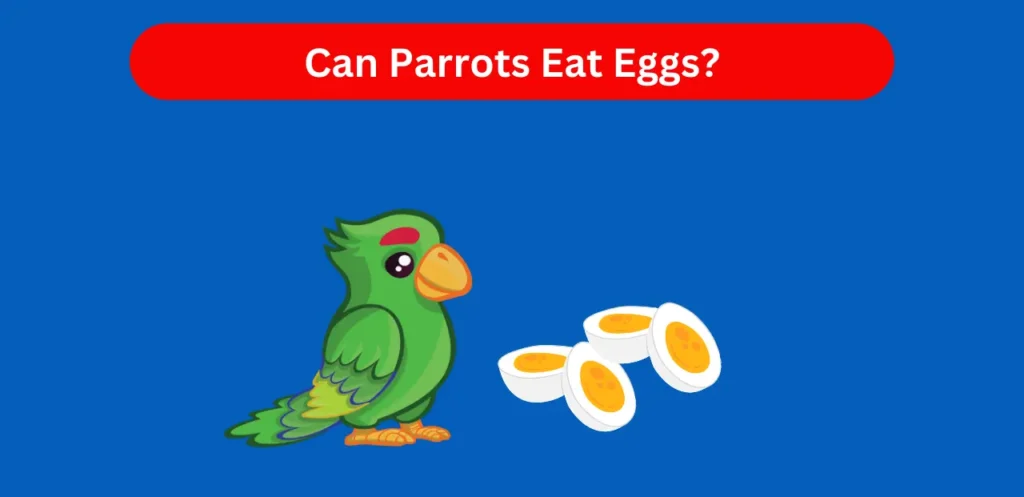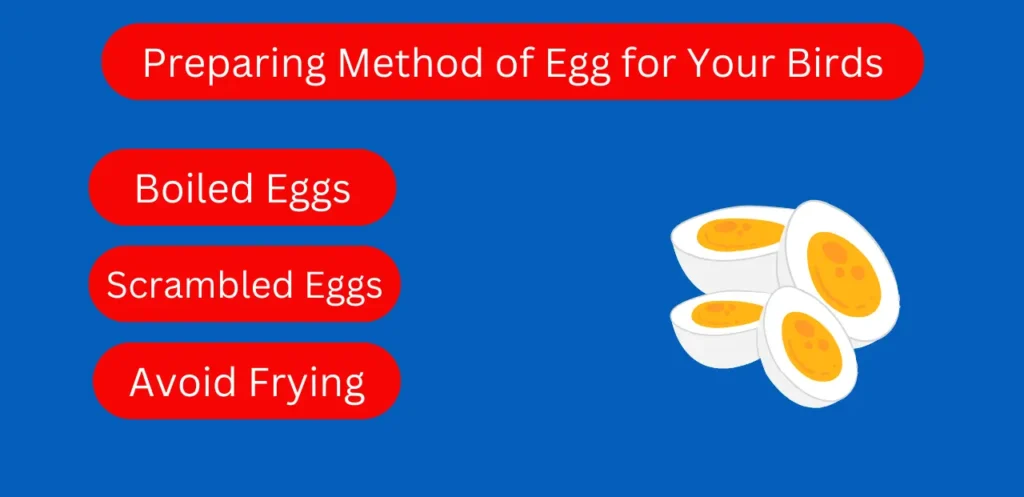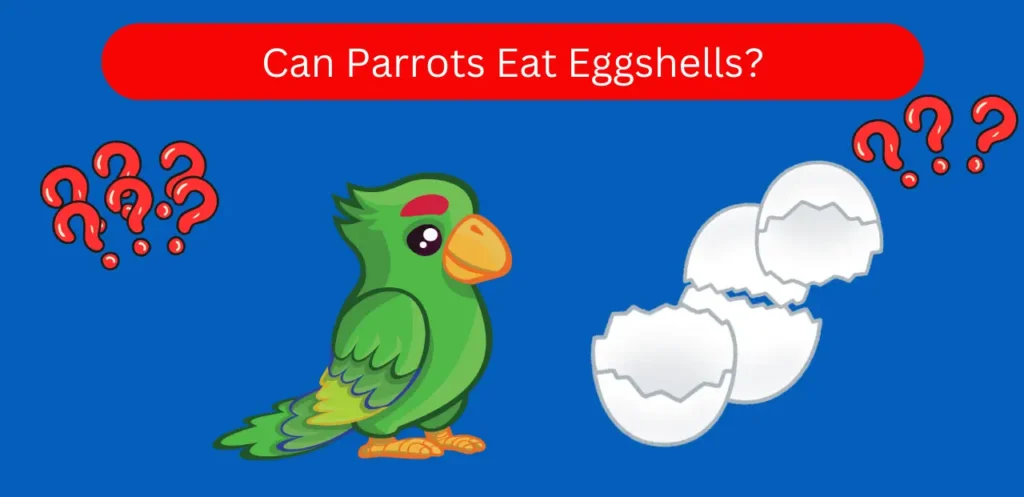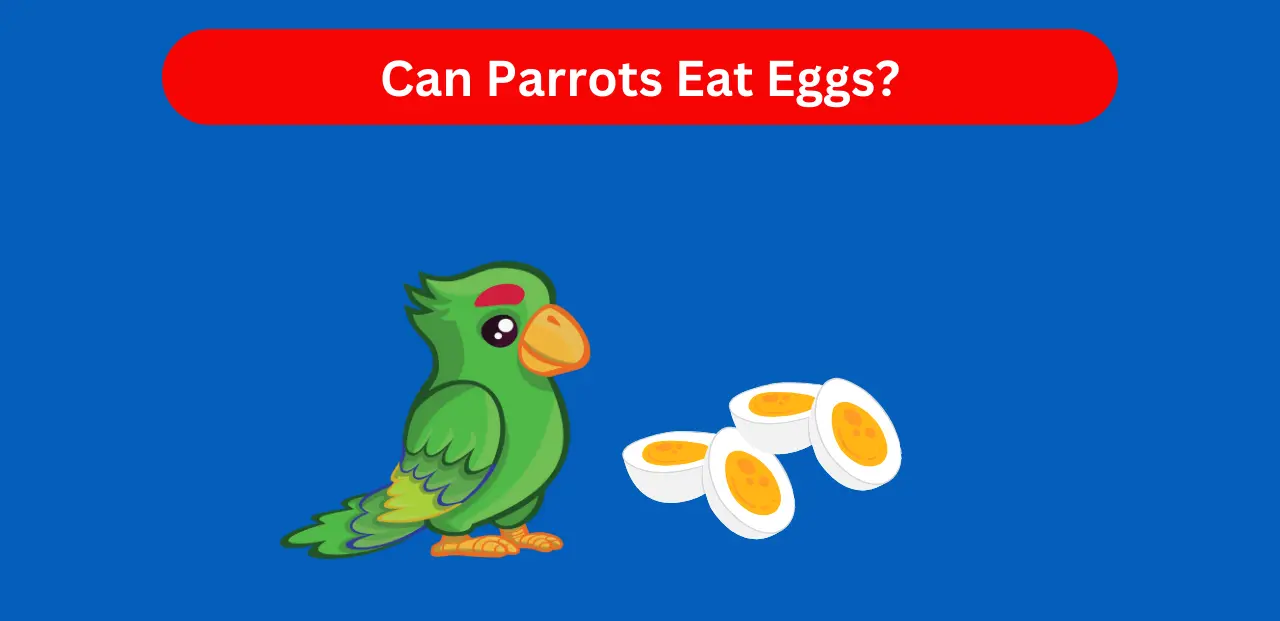Parrots are amazing pets and are very interested and can experiment with many types of food. Any parrot caretaker will, of course, think: what foods are suitable for consumption by a parrot? Also, relatives that can be found in every kitchen, eggs, cause much controversy among birds. Can parrots eat eggs? Yes, they can but also keep in mind in moderation Concept.
Eggs can contain a lot of nutritional benefits for parrots; the question is how to feed them to your bird without harm. In this guide on parrot feeding, we shall reveal all the information that you should have on feeding eggs to your parrot.
Table of Contents
Are Eggs Safe for Parrots to Eat?
Yes, parrots are allowed to eat eggs but our preference should be the cooked eggs. However, there are some imperative conditions which have to be considered in such regards. Before feeding eggs to your parrot, they need to be properly cooked. Raw eggs are full of salmonella and other bacteria that can harm your bird and you as well.

When preparing eggs for parrots do not include salt, butter, oil, or any form of seasoning on the food. These ingredients are not good for the digestion of a parrot. Plain boiled or fried eggs are preferable with no adjuvants added to them. This food should also be taken balanced in the diets which calls for the proper portioning of eggs in the diets.
Nutritional Benefits of Eggs for Parrots
Small quantities of eggs are a rich source of nutrients that have many health benefits to the parrots. They are well endowed with proteins which are proteins for the growth, and repair of muscles and other tissues in the body. In particular, the breeders in the conditions of Stardrop or during molting need high-quality protein that can be found in eggs.
I will note that an abundance of protein in addition to such essential unsaturated amine acids as tryptophane, histamine, methionine, etc, which are not produced by parrots independently. Such amino acids are necessary for immune function, skin, and feathering, to name several of them. Additionally, the parrot’s egg contains fat, which adds fat-soluble vitamins A, D, E, and K to support the parrot’s bone density, skin, and eyesight.
It is as a result important for parrots to take eggs as they contain vitamins and minerals that are essential in their diet. They include B vitamins, for example, B12 and riboflavin vital in the manufacture of energy and the proper use of this resource in the body. It also has minerals such as folate, which is essential for the growth of cells and their repair, and iron which is needed for oxygen transport in the body. Also, calcium is necessary for the growth of bones and proper egg formation in females while iron is beneficial in increasing body hormones.
Also, eggs are rich in choline, which strengthens the brain and can prevent fatty liver disease which is quite popular among pet birds. The yolk contains several nutrients that are essential for skin and heart health, including omega-3 fatty acids to produce a shiny plump feather coat.
However, eggs should be consumed with other fresh fruits, vegetables, and seeds since they are rich sources of different nutrients. Do not overfeed the eggs since they contain high fat levels, thus you may end up fattening the bird.
Do Parrots Eat Eggs in the Wild?
In the wild, parrots get food the way they want, but according to availability. They feed on seeds, nuts, fruits, and sometimes protein sources such as bugs. Occasionally, food may be scarce, and some parrots may act like vultures; they may feed on bird eggs.
Such behavior shows that eggs are not a natural part of those animals’ diet, though they are acceptable as complementary feeding. The domesticated parrot, cannot be expected to seek out his food himself as most birds do, and thus providing eggs should be done carefully and not as a staple diet for the bird.
How to Prepare Eggs for Your Parrot
If you feed your parrot the eggs can either make it safe or unsafe as well as rich in nutrients or lacking such nutrients. Here’s how to do it right:

Boiled Eggs: The easiest and most secure food to prepare would have to be hard-boiled eggs. Scrape off the shell and chop the egg into very small portions and empty dishes for serving.
Scrambled Eggs: Fry eggs with no butter, oil, or even spices. In a way, make sure the skins of those foods are crunchy but the inside part should be cooked well, so you can feed it to your parrot.
Avoid Frying: Fried eggs are packed with unhealthy fats and other additives that are otherwise not healthy for parrots.
Portion Control: Ensure you serve little portions this is because when taken in large proportions eggs may cause an increase in weight or a nutritional imbalance.
How Much Egg Should a Parrot Eat?
As a rule, the quantity of egg soldier should be in moderation, however, it depends on the size of the parrot, its age, and its general state of health but it should not be a staple in their diet. As a rule, small to medium birds like budgies or cockatiels can be offered a small piece of egg, once or twice a week, while larger birds like African Greys or Amazons can have slightly more. The quantity of egg food given to parrots ranges from a teaspoon to 1 tablespoon for small to medium parrots but the large parrots can take up to ¼ to½ of the egg.
The egg should be well cooked (poached boiled or scrambled without putting salt, butter, or oil on it) in order to minimize contact with bacteria for instance salmonella. It is advised that raw eggs should not be given to parrots because there are bacteria that could infect both parrots and humans.
They on no account should replace their normal diet of pellets, fruits, vegetables, and seeds. They should be consumed occasionally, like a delicacy, because they make some useful nutrients, especially proteins, easily available. Feeding eggs in excess, particularly because of the fat that is likely to be found in the yoke, may result in obesity or other complications.
Risks of Feeding Eggs to Parrots
Although eggs are a good source of nutrients for parrots, there are some pitfalls to take into account in case you decide to feed your pet bird with eggs. These risks mainly accrue from overcooking or inadequate preparation of eggs.
- Obesity: As earlier mentioned eggs contain high fat and also they contain a lot of calories and they can produce obesity if given frequently or in large amounts. This increases the danger of developing illnesses such as liver disease, heart disease, and joint disorders. Of course, eggs should be fed to such birds in small portions so that it does not lead to the above-mentioned risks.
- Salmonella: Realizing that eggs if raw or undercooked, contain bacteria, including salmonella which is dangerous for both, birds and humans. Salmonella infection can also lead to bowel symptoms such as diarrhea, vomiting, and lethargy. To reduce this danger, part of cooking eggs should be given to the parrot following proper preparation, and should not feed the parrot raw eggs.
- Nutritional Imbalance: Yes eggs are good for birds but should not be the only source of protein or fat for that matter in the diet of these birds. It means that too frequent feeding with eggs leads to an improper diet of the pet which results in the lack of vitamins, minerals, and even fiber. Your parrot needs to have his food as varied as possible, where he should be taken outside his cage to feed on fresh fruits and vegetables, pellets, and seeds.
- Choking Hazard: Proper preparation should be done on eggs because big portions may lead to choking especially when taking eggs. For better consumption of the egg by the parrot, muse them or chop them in small pieces as this helps in making them safe to feed the parrots.
- Additives and Seasonings: No eggs should be cooked with any seasoning, including salt, butter, oil, or spices of any kind. These additives are poisonous to parrots, they can either cause digestion problems or toxicity to the bird.
Can Parrots Eat Eggshells?
Yes, parrots can safely consume eggshells and the inclusion of the shells into a parrot’s diet will benefit for conures. It is composed of ‘an eggshell which is good for parrots’ bones, feathers, and muscles because it has calcium which improves their digestion system. Calcium is critically important for female parrots at brood condition or molting or laying so that they do not experience conditions such as calcium dump or egg retention.

To safely feed eggshells to your parrot, follow these guidelines:
- Clean the Eggshells: As for the conveniences that have not been described before in the form of eggshells, it must be mentioned that before the shells are washed, they should be washed from egg white or yolk. This is to minimize other bacteria contaminations such as salmonella, within the food.
- Bake the Eggshells: It is perfectly acceptable to wipe the eggshells and then toast them in the oven for ten to fifteen minutes at 200°F (93°C) due to the bacteria component. This facilitates crushing because the shells are always sanitized to stop microorganisms from getting into the feed.
- Crush the Eggshells: Then crack the eggshells into small pieces or for ease of swallowing by the parrot, grind to fine powder after baking. Mainly large whole eggshells should not be given to parrots for their consumers may develop problems trying to break it since it is also large and hard.
- Moderation: As mentioned the eggshells are calcium, they should be consumed in limited quantities and mixed with other foods. Calcium may also interfere with the absorption of other significant microminerals in case there is an excess amount of calcium so upsets the chemical balance of the body.
However, eggshells should not be the only source of calcium for a parrot because apart from the calcium your bird may require other nutrients. preparations based on pellets, fresh plants with calcium, and cuttlebone, as well as eggshells.
Conclusion
In Conclusion, eggs are beneficial food for parrots and may contain such necessary components as proteins of very high quality, amino acids, vitamins, and minerals. Parrots can develop and have quality feathers and appropriate body mass if they have limited access to eggs. However, these should not be viewed as substituting the proper diet consisting of pellets, fruits, vegetables, and seeds. It is advisable to properly cook the eggs to reduce the bacterial threat of Salmonella and it is advisable not to overfeed since eggs are a source of fat.
However, cooked eggshells are a healthy and perfectly safe food that can add calcium to our diet. Just like with any kind of treat foods then one has to be careful at how often and how much one administers to the bird to avoid spoiling their balanced diet. This varies depending on the type of bird, so always it is advisable to consult with an avian vet.
FAQs
Can parrot eat egg yolk?
Parrots can eat egg yolk but should not be fed on them regularly. The yolk contains nutrients that are essential for any animal’s health including protein, fats, vitamins, and minerals that are essential bas for any parrot. High in fat, egg yolk is best given in small amounts for the risk of obesity or an unbalanced diet. People should probably avoid large serving sizes of cooked egg yolk as part of their diets but rather include it in their diet plans.
Can parrots eat fried eggs?
Fried eggs can be considered safe for consumption by parrots but it is not advisable. Fried eggs most are prepared using oils, butter, or spices which are dangerous to the health of parrots since they cause digestion problems or even obesity. Parrots should be fed eggs preferably if they are cooked without fats or seasonings and best, if boiled or scrambled.
Related Posts

Abubakr is a passionate parrot enthusiast based in Pakistan. He shares his life with his vibrant parrot, Peto, and is dedicated to understanding parrot nutrition, behavior, and training. Through his experiences with Peto, Abubakr aims to gain a deeper insight into the needs and personalities of parrots and to share his knowledge with fellow parrot lovers. With a focus on the nutrition of conures, Abubakr is excited to connect with like-minded individuals and learn from their experiences.
